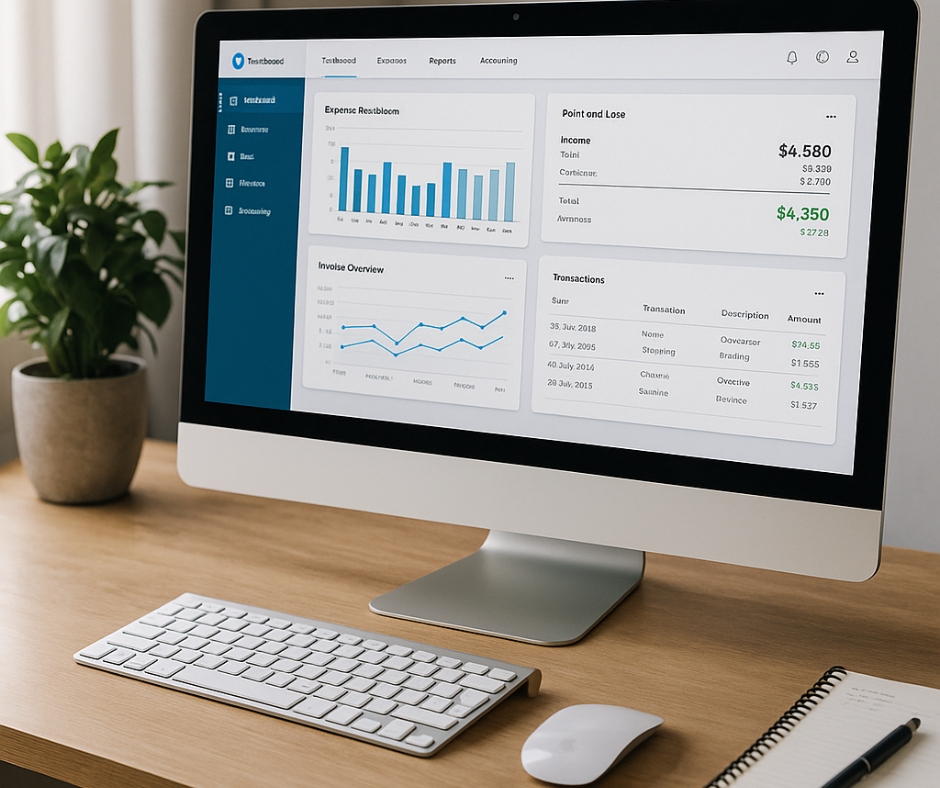When you’re running a small business, every dollar, minute, and decision matters. That’s why choosing the top accounting software for your specific needs can be one of the most impactful decisions you make. From streamlining cash flow to simplifying tax season, the right software doesn’t just keep your books clean—it frees your time, minimizes errors, and helps you scale with confidence.
Below, I’ve laid out a comprehensive breakdown of the most effective accounting platforms for small businesses in 2025. Whether you’re a solopreneur, freelancer, or scaling a growing team, there’s something here for you.
🧾 QuickBooks Online
QuickBooks Online continues to be the gold standard for small business accounting. It offers a full suite of financial management tools that cover everything from invoicing and expenses to payroll and tax tracking.
What makes QuickBooks Online particularly powerful is its robust reporting engine and integration ecosystem. It connects easily with third-party tools like Shopify, PayPal, Square, and even your CRM. The dashboard is intuitive, allowing business owners to quickly understand key metrics like profit and loss, outstanding invoices, and cash flow projections.
Best For: Small to medium-sized businesses that need scalable and professional features.
Notable Features: Bank reconciliation, customizable reports, receipt capture, multi-user access, and payroll add-ons.
Pricing: Starts at $30/month for the Simple Start plan and scales with added features.
📊 Xero
Xero is a user-friendly, cloud-based accounting software with a clean interface that’s ideal for business owners who don’t have a financial background. Despite its simplicity, Xero offers powerful tools that rival its competitors.
One major highlight is its real-time bank feeds and reconciliation, which saves hours of manual work. Its project tracking, inventory management, and multi-currency features also make it a solid choice for service providers and international businesses.
Best For: Business owners who value simplicity and a strong user experience.
Notable Features: Time tracking, inventory, smart bank reconciliation, multi-currency support.
Pricing: Starts at $20/month for basic access.
🧑💼 FreshBooks
FreshBooks has made a name for itself among freelancers and service-based professionals for its elegant time tracking and client invoicing tools. It simplifies the billing process, letting users convert hours into invoices with just a few clicks.
Its interface is clean, and its mobile app is among the best in class. While it lacks some advanced accounting features like job costing or deep reporting, it excels at keeping solo entrepreneurs organized and paid on time.
Best For: Freelancers, consultants, and service-based businesses.
Notable Features: Time tracking, recurring billing, automated payment reminders, client portal.
Pricing: Starts at $15/month.
📈 Zoho Books
Zoho Books is one of the most underrated contenders in this space. As part of the larger Zoho ecosystem, it integrates seamlessly with Zoho CRM, Zoho Inventory, and even Zoho Payroll, offering a unified business management solution.
It includes advanced automation for workflow rules, sending invoices, managing expenses, and even following up with clients. The customer portal feature allows clients to view and pay invoices, reducing back-and-forth emails.
Best For: Small businesses already using Zoho products or those looking for automation.
Notable Features: Automated workflows, integrated ecosystem, detailed audit trails.
Pricing: Starts at $20/month with a free plan for businesses under $50,000 annual revenue.
💸 Wave Accounting
If your budget is tight, Wave is a dream come true. It’s 100% free for its core accounting features, which include income and expense tracking, invoicing, and receipt scanning.
Despite being free, it doesn’t skimp on quality. The interface is easy to navigate, and it’s especially useful for solopreneurs and microbusinesses. However, support options are limited unless you pay for add-on services like payroll.
Best For: Startups, solopreneurs, and side hustlers with minimal needs.
Notable Features: Unlimited invoicing, receipt scanning, basic reporting.
Pricing: Free for core features; paid add-ons for payroll and support.
🧾 Sage 50
Sage 50 is built for those who need more advanced accounting features such as job costing, detailed budgeting, and inventory tracking. It’s a desktop-based solution, which appeals to businesses that prefer local control over cloud-based tools.
It’s ideal for businesses that require a bit more horsepower and want deep customization. While not the easiest software for beginners, it offers deep accounting power under the hood.
Best For: Manufacturing, construction, and businesses with complex needs.
Notable Features: Advanced inventory, job costing, multi-company support.
Pricing: Starts at $62/month.
🌐 NetSuite
NetSuite by Oracle is more than just accounting software—it’s a full-blown ERP solution. It’s perfect for businesses that are growing quickly and need to integrate operations across finance, CRM, inventory, and HR.
While it comes with a steeper learning curve and a higher price tag, the ROI is significant for companies ready to invest in an all-in-one system that can scale.
Best For: Rapidly growing companies and mid-sized enterprises.
Notable Features: ERP capabilities, global compliance, multi-department reporting.
Pricing: Customized based on needs and user count.
🛠 Odoo
Odoo is open-source and modular, meaning you can add exactly what you need—no more, no less. It offers full accounting features, plus optional add-ons for CRM, inventory, POS, and more.
It’s extremely flexible, making it ideal for businesses with unique workflows. It does, however, require more technical knowledge or access to a developer to customize fully.
Best For: Tech-savvy businesses looking for customizable solutions.
Notable Features: Open-source flexibility, integrated business apps, strong community support.
Pricing: Starts free for one app; additional modules cost extra.
💻 Moneyspire
Moneyspire is a lightweight solution perfect for individuals who run very small operations or side businesses. It’s more of a personal finance tool that can handle simple business bookkeeping.
It offers basic reporting, bill tracking, and budgeting tools. While not suited for complex business operations, it’s a step up from spreadsheets for freelancers or gig workers.
Best For: Freelancers or solopreneurs who need a basic tool.
Notable Features: Cross-platform, check printing, budget management.
Pricing: One-time license fee around $49.99.
🔓 LedgerSMB
LedgerSMB is a powerful open-source alternative for businesses that want to host their own accounting system. It provides core accounting features like AR, AP, general ledger, and inventory management.
It requires a bit of technical know-how but rewards users with security, flexibility, and zero recurring software costs. Updates are community-driven, and it’s ideal for privacy-focused organizations.
Best For: Tech-oriented businesses wanting full control.
Notable Features: ERP capabilities, customizable reports, open-source.
Pricing: Free, with costs associated with hosting and setup.
Final Thoughts
Choosing the top accounting software for your small business in 2025 boils down to your size, complexity, and goals. Do you want free and simple? Go with Wave. Need full ERP? Consider NetSuite. Freelancers? Try FreshBooks.
No matter which platform you choose, adopting the right software will pay off in clarity, time, and long-term growth.













